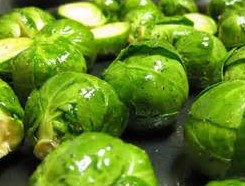Compliments of :
Seniors Tip: Visiting During the Holiday Season
Joke or Quote of the Month:True Heroism
Heart Healthy Recipe:Brussels Sprouts with Caramelized Onions and Pistachios
Did You Know? Boost Your Metabolism
The Holidays-A Time for More Presence and Fewer Presents
For many seniors, the holidays are no longer a time of celebration and joy, but rather reminders of how lonely they may be, the friends that have passed on, the lack of family gatherings and an inability to participate in such events. The ‘holiday blues’ certainly don’t just affect the elderly, but those blues may be compounded in the elderly by limited mobility, a lack of social interaction and depression. Isolation is often the precursor to depression. Geography, weather and mobility can play a significant part, but so too can attitude. When it becomes ‘too much bother’ to socialize, we have a problem. That lack of regular contact with others can lead to depression and a feeling of worthlessness. Depression is a very real danger in the elderly. Sadness during the holiday season is a fairly normal experience for many seniors. However, if you have noticed the symptoms of depression year-round, then it is important to take action and consult a skilled professional. Some of the most common symptoms of elderly depression may include:
- Change in sleeping habits
- Difficulty sleeping
- Apathy or lethargy
- Change of appetite
- Loss of interest in activities
Loss of interest in socializing Of course, these cues are most noticeable to folks who visit often. But the symptoms will also be apparent to those who regularly check-in by phone. Seniors need to talk: often about the past, and sometimes about the future. Occasionally, it may be worrisome or negative, but listeners should understand that it all must be voiced. Because only when the issue is out in the open can it be addressed — be it by family, friends or health professionals. Empathy, and not necessarily total agreement, is the key. We all lead busy lives: your time is precious to you. However, time is the most valuable gift you can give your elders — and not just during the upcoming holidays. Maximize that time, and the value of that time, by simplifying your life and focusing on the meaningful — people. Your elders are far more likely to remember the time you spent laughing over a photo album or talking about their childhood — not about the new scarf or slippers.
“I wish I’d spent less time with her” or “I should have given her that blue cardigan,” said no one at Mom’s funeral. What is memorable are the meaningful interactions. So make sure the time spent with your elders — or on the phone to them — is meaningful.
The bottom line is to encourage loved ones to stay active, involved and engaged in family and community events whenever possible. These activities don’t have to be elaborate: they can be anything that helps make them feel a sense of belonging and provides them with the ability to continue contributing to family and community well-being, regardless of age. I would like to challenge you, dear readers, to spend more time this season talking to a senior in your life, on your street or in your building. Visit them, phone them, take them out or invite them over. Talk to them, ask questions, but above all, listen to them. Almost without knowing it, you will make them feel special, and provide them with a sense of self-worth.
So instead of giving gifts this season, consider granting a senior the most meaningful gift of all — your time. Later, maybe much later, you’ll be glad you did.
Article by Alex Handyside, CPCA
Heart Healthy Recipe: Brussels Sprouts with Caramelized Onions and Pistachios
Ingredients-2 medium red onions, thinly sliced, 2 tbsp (25 mL) olive oil, 1 tbsp (15 mL) balsamic vinegar, 4 cups (1 L) shredded Brussels sprouts (about 680 g or 1 1/2 lb), 1 tsp (5 mL) freshly grated black pepper, ¼ tsp (1 mL) salt, 1 tbsp (15 mL) chopped pistachios or pecans, unsalted.
Directions-Heat a large non-stick fry-pan to medium heat. Add oil and onions and cook for 40 minutes, stirring often. The onions will get very soft and mushy. Make ahead: cooked onions can be stored in the fridge for 1 day. Reheat before adding the rest of the ingredients. Add balsamic vinegar and brussel sprouts and cook for 10 minutes. Add pepper and salt. Place in serving dish and top with pistachios or pecans.
Nutritional Information Per Serving (½ cup / 125 mL) – Calories: 79, Protein: 3 g, Fat: 4 g, Saturated fat: 1 g, Dietary cholesterol: 0 mg, Carbohydrate: 10 g, Dietary fibre: 3 g, Sodium: 91 mg, Potassium: 315 mg.
Developed by Nadine Day for the Heart and Stroke Foundation ©2007. Reprinted with Permission from The Heart and Stroke Foundation.
Seniors Tip: Visiting During the Holiday Season
 Visiting friends and family over the holiday season can be a time to reconnect with those we haven’t been in touch with much throughout the year. Visits can be enjoyed and appreciated, but they can also add additional demands and stress to already overwhelmed family caregivers and care recipients who are frail, elderly or ill. Whether you are visiting someone else or others are coming to your home, or whether the visit is for an evening or for an extended stay, here are some tips to help reduce stress and allow everyone to enjoy this time together. If you are the primary family caregiver, and hosting the visit:
Visiting friends and family over the holiday season can be a time to reconnect with those we haven’t been in touch with much throughout the year. Visits can be enjoyed and appreciated, but they can also add additional demands and stress to already overwhelmed family caregivers and care recipients who are frail, elderly or ill. Whether you are visiting someone else or others are coming to your home, or whether the visit is for an evening or for an extended stay, here are some tips to help reduce stress and allow everyone to enjoy this time together. If you are the primary family caregiver, and hosting the visit:
- Ask for and accept help. Make a list of what needs to be done. If someone asks what they can do to help, respond with specific requests. Focus on people’s strengths. Some visitors are happy to help with personal care, while others would prefer to grocery shop or clean the gutters.
- Allow others to share in the caregiving. This can give you a break. Allow them to contribute, and give the care recipient an opportunity to interact with someone new.
- Don’t feel you have to “entertain” your visitors. Sometimes simply spending time together is enough.
- Remember to take time to have some fun, share and laugh too.
- Make arrangements well in advance. Even if you are only coming for a short visit, call ahead to ask the caregiver what time would be best. When is everyone’s energy strongest? When are people resting?
- For longer visits, ask whether it would be better to stay with them or elsewhere.
- Resist the urge to advise the caregiver about what they should be doing differently. Remember what happens during your visit may not be the same as day-to-day care. Often the ill person will rally forth when visitors come.
- Plan to visit in small groups for short periods, so that neither the caregiver nor care recipient becomes too exhausted. ◦Offer to help with chores, errands or other holiday-specific tasks, such as shopping, baking and decorating.
- Allow the caregiver to get away and have some free time. Perhaps give him or her a gift of a lunch out, a trip to the spa or a chance to attend some holiday events.
- Express your appreciation to the family caregivers. Simple recognition of their time and effort may be enough to make caregivers feel more appreciated and help them stay strong, healthy and better able to continue to provide care.
Did you know? Boost Your Metabolism
Poor lifestyle habits, including repetitive weight gain and loss, can program your body to operate at a slower rate. When your body’s metabolic (activity) rate is slow, it’s less efficient at burning calories. If we restrict food, the body protects itself by slowing its metabolic rate to conserve energy. In chronic dieters, the body learns to conserve fat for energy, in anticipation of another diet. This causes metabolism to slow. However, it is possible to change this with sensible lifestyle practices. First, have patience. Boosting metabolism may take time, especially if you’ve been carrying excess body fat for some time. A slow weight loss allows your body and your mind to adapt to functioning at a lower level of bodyweight. That’s why quick weight loss diets are never permanent. It’s a shock to the body when weight is lost quickly, and the body fights to regain the levels of body fat it was familiar and comfortable operating with. Eat sensibly. Severe caloric restriction won’t work. Eating and digesting actually burns calories, thereby speeding the metabolism. For some, smaller more frequent meals help boost a sluggish metabolism. If frequent eating won’t work for you, try to eat at regular meal times, especially when hungry, and keep healthy snacks handy for emergencies.
Eat when your stomach signals it’s hungry and stop eating when you are content (chew your food slowly, and “listen” to your body). Choose mostly high fibre foods for satiety, like whole grains, vegetables and legumes. Restrict the highly processed, sweetened foods, as this may play havoc with your insulin response and stimulate your appetite. Another satiety trick; have a small amount of protein (nuts, legumes, dairy products, eggs, fish or chicken) with each meal or snack.
Get active. Physical activity also increases metabolic rate. Follow a regular, moderate exercise program or physical activity. In addition, sneak in several gentle exercises throughout the day. Do a few easy squats, abdominal crunches, or push-ups against a desk or wall. Take the stairs and walk more often. Keep exercise items handy at home or at the office, like a mini trampoline, mini-stepper or hand-held weights. Even a gentle activity lasting three to five minutes can keep your mind alert as well as train your body to work at a faster rate.
Eat wisely, exercise regularly, and be patient. Your body can be trained to burn calories more efficiently.
Article by Eve Lees, Reprinted with Permission from Senior Living Magazine, www.seniorlivingmag.com
Joke or Quote of the Month: True Heroism
“I think a hero is an ordinary individual who finds the strength to persevere and endure in spite of overwhelming obstacles.”
Christopher Reeve

